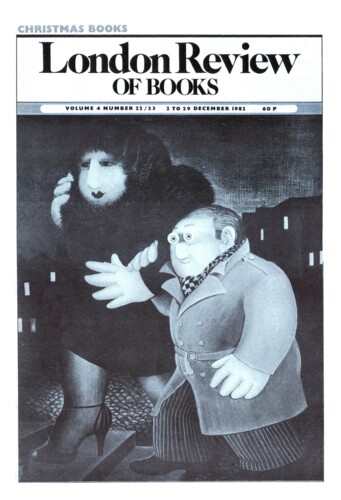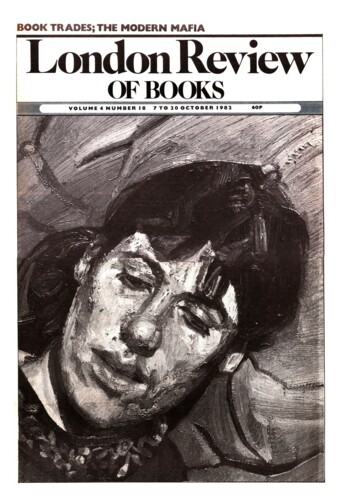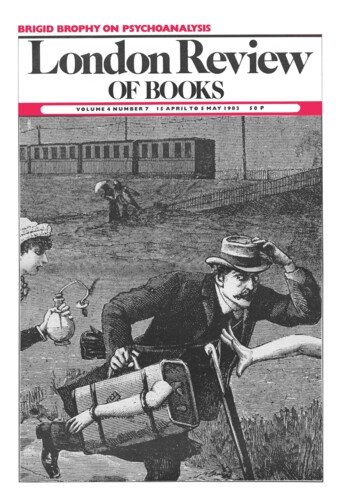Brigid Brophy
Brigid Brophy’s most recent books are The Prince and the Wild Geese, the text for a series of drawings inspired by Prince Gagarin’s love for Julia Taaffe in 1832, and A Guide to Public Lending Right.
Shaviana
Brigid Brophy, 2 December 1982
The most charming fact I have stumbled on in intellectual history is that Freud and Shaw were shocked by one another. Freud’s wounded romanticism speaks in his reference (in Group Psychology, 1921) to ‘Bernard Shaw’s malicious aphorism to the effect that being in love means greatly exaggerating the difference between one woman and another.’ If I am right in supposing that what he had in mind is one of the speeches Undershaft addresses to Cusins at the climax of Major Barbara, ‘Like all young men, you greatly exaggerate the difference between one young woman and another,’ then Freud has performed a little secondary elaboration. In substance it is fair. The ‘being in love’ is extrapolated from the dramatic context, where Cusins is indeed in love. But in giving the words the formal and impersonal turn of an aphorism Freud suppresses the dramatic characterisation, including that of Undershaft as the Prince of Darkness, and attributes to Shaw himself both the supposed aphorism and its supposed taint of the ‘malicious’.
Arts Councillors
7 October 1982
Arts Councillors
Brigid Brophy, 7 October 1982
My fellow members of the Left often seem to have met an entirely different middle class from the one I was brought up in. Left-wing chat about education accepts without challenge the thesis that book learning comes easily to middle-class children because they come from homes conversant with books. Chat (which is rarer) about arts policy accepts that ‘standards’ and ‘quality’ are bourgeois conventions which the middle class has contrived to impose on public patronage of the arts, thereby getting itself, at the taxpayers’ expense, a bonanza of the kinds of art which it happens to enjoy. This gives me a surreal feeling that I must be the only member of the Labour Party who has hacked through the pampas grass in the front garden, penetrated the mock-half-timbered facade and set actual foot in any of the thousands of middle-class homes where no kinds of art are enjoyed, where the most bookish book to be accorded houseroom is the AA Members’ Handbook and where an invitation to partake in the bourgeois bonanza by passing a publicly subsidised evening at a Shakespeare play or a Bartok opera would elicit bafflement, fear or derision.
Unfair to Reich
15 April 1982
Pieces about Brigid Brophy in the LRB
Unblenched: Homage to Brigid Brophy
Lucie Elven, 21 March 2024
Brophy’s writing is propelled by the excitement of the intellect, while the emotion is held within the structure. She found a form for her work that accommodated her need for artifice, for self-creation...
Recognising Mozart
Peter Gay, 7 July 1988
The literature on Mozart is almost as diverse, though surely not quite so glorious, as Mozart’s own output. These three books are a case in point: a freewheeling analysis of Mozart the...
Skinned alive
John Bayley, 25 June 1987
Amusing, and perhaps instructive, to think of great paintings whose voyage into mystery and meaning seems to depend, in the first instance, on a technical trick: a separation of planes so that...
In praise of Brigid Brophy
John Bayley, 5 March 1987
In his recent book Reasons and Persons the Oxford philosopher Derek Parfit is inclined to decide that persons have no existence, and that the motives to morality are for that reason clearer and...
Julia Caesar
Marilyn Butler, 17 March 1983
The Prince and the Wild Geese is a story of 1832 told in words and pictures, the words almost all Brigid Brophy’s, the pictures by Prince Grégoire Gagarin, artist son of the Russian...
A Writer’s Fancy
D.J. Enright, 21 February 1980
Brigid Brophy’s novels have often been described as ‘brilliantly written’: a judgment which can have done her sales little good. (‘Don’t bother with that book...
Read anywhere with the London Review of Books app, available now from the App Store for Apple devices, Google Play for Android devices and Amazon for your Kindle Fire.
Sign up to our newsletter
For highlights from the latest issue, our archive and the blog, as well as news, events and exclusive promotions.



